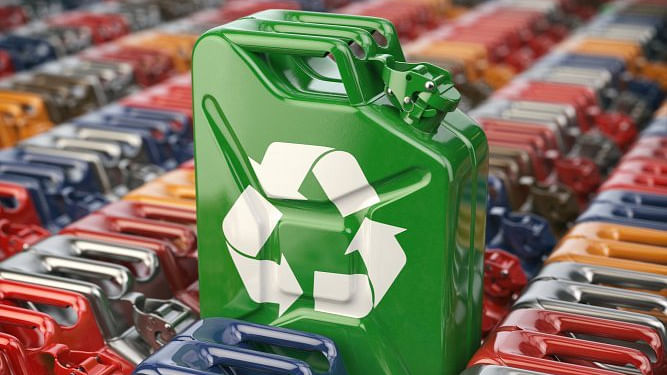
Karnataka is preparing to play a bigger role in India’s energy diplomacy and fuel security as oil moves to the front and centre of global energy supply chains in a fallout of the Russia-Ukraine war.
Buried in Finance Minister Nirmala Sitharaman’s 85-minute-long Budget Speech was a small paragraph announcing the allocation of Rs 5,000 crore for crude purchases for India’s strategic petroleum reserves. The announcement has the potential to consolidate Karnataka’s primary position as a location for emergency storage centres for India’s reserve fuel.
Combined with an enhanced allocation of 27 percent to State-run oil companies to expand their refining and fuel retailing capacities, Karnataka’s place in India’s energy map is set to expand. Mangalore Refineries and Petrochemicals Ltd. is projected to receive Rs 8.2 billion in the next fiscal year to increase its refining and fuel marketing capabilities, according to Union Budget papers.
Also Read | Gadkari bats for decarbonising transport sector, pushes for ethanol economy
Under normal circumstances, these budgetary allocations would be nothing more than routine financial allotments. In the fast-changing global and national energy scenario, however, they must be seen in conjunction with two important events currently underway in Bengaluru. One is the India Energy Week 2023 (from February 6 to 8), which was inaugurated by Prime Minister Narendra Modi. The other is an Energy Transition Working Group meeting from February 5 to 7. Both events are taking place under the umbrella of India’s ongoing presidency of the Group of Twenty (G20).
Beyond the stated agenda of the two events, there will be behind-the-scenes discussions on setting up an International Biofuel Alliance during India’s G20 presidency. If all goes well, the new global alliance, potentially a gamechanger in future energy transitions, could be launched during the G20 summit in New Delhi in September. The launch roadmap will be similar to the launch by Modi and then French President Francois Hollande of the International Solar Alliance (ISA) during the 2015 climate conference, COP21, in Paris, which finalised the historic international treaty on Climate Change. The ISA is headquartered in Gurugram on the outskirts of Delhi.
With laser-sharp and focused lobbying by Karnataka, Bengaluru could be the headquarters of the new International Biofuel Alliance. Hardeep Singh Puri, the Minister for Petroleum and Natural Gas, dropped hints at this possibility during a curtain-raiser for the India Energy Week, held in Bengaluru on December 16. With Chief Minister Basavaraj Bommai by his side, Puri said: “Bangalore is a city that has grabbed attention not just within country but also globally due to its spirit of innovation, entrepreneurs' talent and startups, particularly in the energy sector. In addition to the location for the India Energy Week, some context-setting becomes necessary.”
Sao Paulo is likely to offer stiff competition to Bengaluru in hosting the proposed alliance since Brazil has an advanced biofuels industry. More than 150 key decision-makers on energy transitions from 29 countries and 10 international organisations will have a window on Bengaluru in this context during the three-day Energy Transition Working Group meeting.
Permude, a small village near Mangaluru, is already well-known in the global oil industry’s corporate boardrooms in Abu Dhabi, Amsterdam, and London. That is where oil from the Abu Dhabi National Oil Company (ADNOC) is stored in rock caverns of the Indian Strategic Petroleum Reserve Limited (ISPRL), a subsidiary of the government’s Oil Industry Development Board. Padur, also a village, in Udipi district, has another ISPRL facility, where imported crude is stored as strategic reserve.
Also Read | Petrol doped with 20 pc ethanol starts retailing in 11 states/UTs
After several years of negotiations between the Ministry of Petroleum and Natural Gas and various oil majors in Europe and the Gulf, an agreement was clinched with the ADNOC in January 2017 to store their crude at the ISPRL facilities in Karnataka. When the first shipment of crude under this agreement set sail for Mangalore port about a year and a half later, it turned a buyer-seller relationship in oil with the United Arab Emirates (UAE) into one of strategic co-operation in energy security. The latest budget allocation of an additional Rs 5,000 crore for reserve crude oil purchases will raise the importance of the rock caverns in Karnataka for India’s energy security.
The petroleum ministry said recently that the Union Cabinet has given “in principle” approval for expanding storage at Padur and for a new ISPRL facility at Chandikhol in Odisha through public-private partnership to reduce the budgetary burden on the government. This will further increase Karnataka’s role in India’s overall fuel security and energy strategy, for which the events in Bengaluru will serve as a shot in the arm.
(KP Nayar has extensively covered West Asia and reported from Washington as a foreign correspondent for 15 years.)
(The views expressed are the author's own. They do not necessarily reflect the views of DH.)